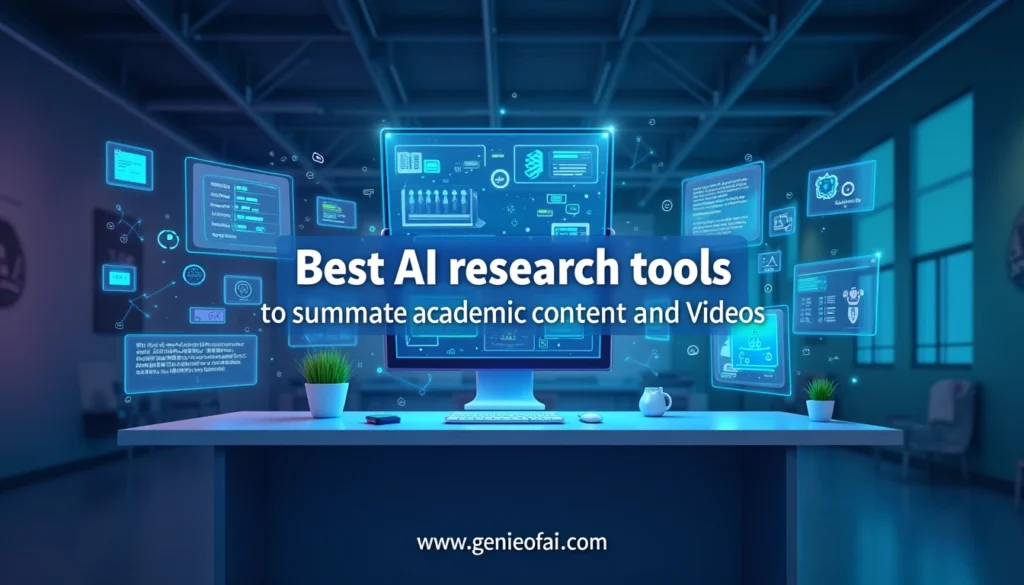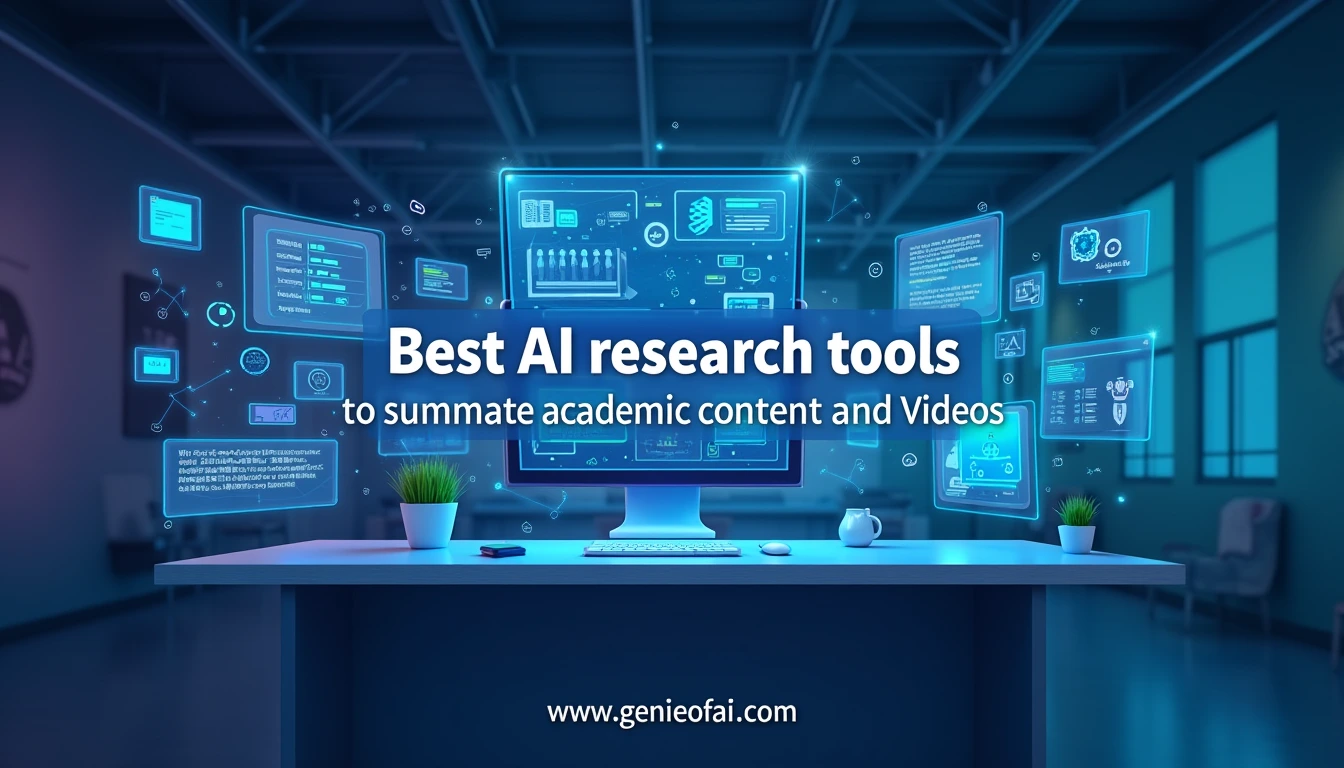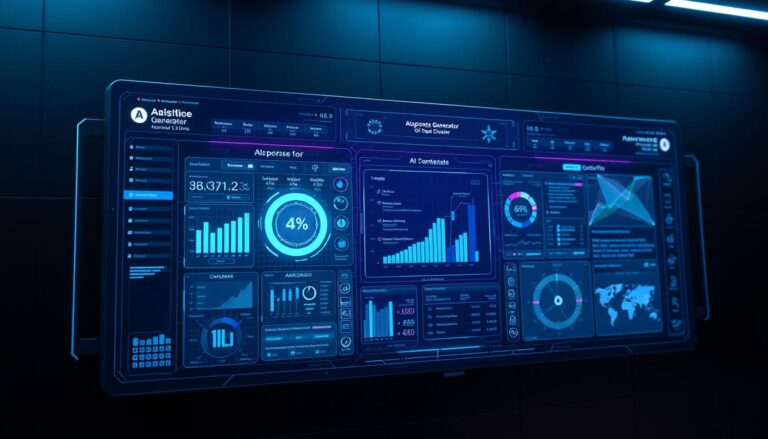Best AI Research Tools to Summarize Academic Content and Videos in 2025
Table of Contents
When Time Isn’t on Your Side, AI Can Be
You know that sinking feeling. You’re staring at a 40-page academic paper, or worse, a 90-minute lecture video, and your deadline is screaming at you. You want the knowledge, the key points, the takeaways – but you don’t have the luxury of time. That’s where AI research tools come to the rescue. Like having a digital assistant who never sleeps, these tools condense the chaos into clarity. In this article, you’ll uncover the best AI tools that turn overwhelming academic content and videos into sharp, easy-to-digest summaries that save your sanity and supercharge your study sessions.
Why Use AI Research Tools for Summarizing Academic Content and Videos?
Save Time and Boost Productivity
- Process dozens of papers in the time it takes to read one
- Speed through literature reviews and research prep
- Instantly digest lectures without rewatching
Improve Comprehension and Retention
- Focus on the core ideas without the fluff
- Repackage dense academic language into readable insights
- Helpful for non-native English speakers and neurodivergent learners
Academic work doesn’t have to feel like a chore. With the right AI tools, you can make room for deep thinking, instead of drowning in data.
Top AI Research Tools to Summarize Academic Papers
1. Semantic Scholar’s TLDR AI
You’re likely already using Semantic Scholar to find peer-reviewed papers. TLDR AI takes it a step further by giving you the gist of a paper in one short sentence. It focuses on clarity and conciseness.
Key Features:
- 1-line summaries for quick scanning
- Works on scientific and medical papers
- Integrated within search results for fast filtering
Ideal for when you’re browsing through dozens of titles and need to know instantly if a paper is worth your time.
2. Scholarcy
Scholarcy turns any academic paper into a set of summary flashcards. It pulls out the abstract, main findings, and key data points. It even highlights tables and figures you shouldn’t miss.
Highlights:
- Accepts PDFs, Word docs
- Integrates with reference managers like Zotero
- Links to background reading
Perfect for students or researchers juggling multiple papers and short on time.
3. Scite.ai Smart Citations
If you care about credibility, Scite.ai is your go-to. This tool shows you how a paper has been cited by other scholars: was it supported, mentioned neutrally, or disputed?
Benefits:
- Smart citation context
- Graph-based summaries
- Tracks how a claim evolves in academic debate
Use this when you want not just a summary, but an understanding of a paper’s reputation and relevance.
Best AI Tools for Summarizing Video Lectures and Academic Talks
1. Eightify
Eightify is a Chrome extension that summarizes YouTube videos with pinpoint accuracy. Whether it’s a TED Talk, academic lecture, or documentary, it extracts the key takeaways into bullet points.
Pros:
- Summarizes videos in seconds
- Ideal for visual learners and multitaskers
- Works directly within YouTube
2. Otter.ai
Otter.ai transcribes and summarizes audio in real time. It’s incredibly helpful for students recording live lectures or professionals reviewing interviews.
Features:
- Accurate transcription
- Summary and keyword generation
- Syncs with Zoom, Google Meet
Best used during lectures or to revisit key points from past recordings.
3. Wisio.ai (formerly Gling)
Designed for content creators and learners alike, Wisio.ai breaks down complex academic videos into digestible summaries. It works across multiple formats and offers scene-level analysis.
Capabilities:
- Context-aware summarization
- Suitable for research presentations
- Supports multiple languages
Comparison Table of AI Tools
| Tool | Best For | Academic Format | Summary Type | Free Version? |
|---|---|---|---|---|
| Scholarcy | Research papers | PDF, DOCX | Flashcards | Yes |
| TLDR (SS) | Science/medical papers | Web, PDF | 1-line summary | Yes |
| Otter.ai | Lectures, interviews | Audio/Video | Transcript | Limited |
| Eightify | YouTube videos | Online videos | Bullet points | Yes |
| Scite.ai | Paper credibility | Research articles | Citation review | Yes |
How to Choose the Right AI Tool for Your Academic Needs
Key Criteria to Consider
- Content format: Do you need to summarize a paper, video, or audio file?
- Integrations: Are you using tools like Zotero, Google Docs, or YouTube?
- Depth vs. speed: Some tools are built for quick scans; others for deep dives.
- Budget: Many tools offer a free version, but advanced features are often behind paywalls.
Pro Tip
Combine tools for maximum efficiency. Use TLDR AI to scan for relevance, Scholarcy to dig deeper, and Scite.ai to validate credibility.

A Student’s Week Using AI Research Tools (Case Study)
Monday: You record a 2-hour lecture and upload it to Otter.ai. It spits out a transcript and a condensed summary. You highlight key terms.
Tuesday: Download three research papers and upload them to Scholarcy. Each gets turned into digestible flashcards, with citations and core arguments extracted.
Wednesday: You watch a complex economics video on YouTube using Eightify. It gives you a bullet-point summary, which you copy into your notes.
Thursday: You use TLDR AI to browse new studies and bookmark the ones with promising summaries.
Friday: Before submitting your report, you run your main source through Scite.ai to check if it’s cited supportively or not. You revise accordingly.
This approach doesn’t just save time—it builds confidence.
Pros and Cons of AI-Powered Summarizers
Pros
- Saves hours each week
- Boosts learning retention
- Accessible for all learning styles
- Encourages strategic reading
Cons
- Can miss nuance in complex arguments
- Requires clean input (clear PDFs, quality audio)
- Doesn’t replace full comprehension or critical thinking
Use AI tools as an assistant, not a replacement.
Frequently Asked Questions (FAQ)
What are the best AI research tools to summarize academic content and videos?
Tools like Scholarcy, Otter.ai, Eightify, TLDR AI, and Scite.ai offer fast, accurate summarization tailored to different content types.
Are AI summarizers accurate for academic use?
They offer high accuracy for general understanding, but always cross-check important points before citing or relying on them fully.
Can I use AI summarizers for free?
Yes. Many tools offer basic features for free. Paid plans often unlock advanced summarization, integrations, or more volume.
Do these tools work for all academic fields?
Yes, but they work best for structured fields like STEM. For humanities or subjective analysis, deeper reading may still be necessary.
Conclusion: Make Smarter Study Choices with Less Stress
Imagine reclaiming your time, cutting your reading list in half, and still performing at your academic best. With the best AI research tools to summarize academic content and videos, that’s not a dream — it’s your new reality.
These tools are your unfair advantage in a world that moves fast. Use them smartly, and you’ll never have to choose between speed and understanding again.







